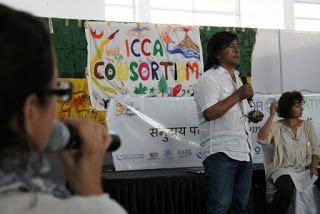 |
|
Jorge Nahuel (Mapuche Tribe, Argentina) speaking about a
tri-national coalition of Indigenous peoples. Photo credit:
Aurelie Neumann / ICCA Consortium.
|
On 11 October at the 11th Conference of the Parties to the Convention on Biological Diversity (CBD COP11), the ICCA Consortium, Global Environment Facility Small Grants Programme (GEF-SGP), and many local partners co-hosted a 3-hour workshop entitled “National ICCA Federations and Coalitions Ready to Take Conservation Authority and Responsibilities Towards Fulfilling the Aichi Biodiversity Targets”. The workshop shared experiences of a range of federations and coalitions of Indigenous peoples’ and community conserved territories and areas (ICCAs) from around the world, including the Philippines, Madagascar, Nepal, India, Iran, and Argentina. Additional reflections were provided by representatives from GEF-SGP, Australia, Pakistan, Taiwan, the Democratic Republic of Congo, and the Philippines.
Particular emphasis was placed on how federations, coalitions and related social movements are being mobilised at all levels to secure Indigenous peoples’ and local communities’ rights, customary territories, and ways of life. Delfin Ganapin (GEF-SGP) reminded workshop participants that because federations have the potential to challenge the political status quo, the stronger the social movements become, the more resistance they will likely face from governments and industries in power. In the words of Dave de Vera (Philippine Association for Intercultural Development), despite significant legal and policy gains, “There is still so much to be done; the struggle will always continue.”
More information about the ICCA Consortium’s engagement in CBD COP11 is available here.
